Your cart is currently empty!
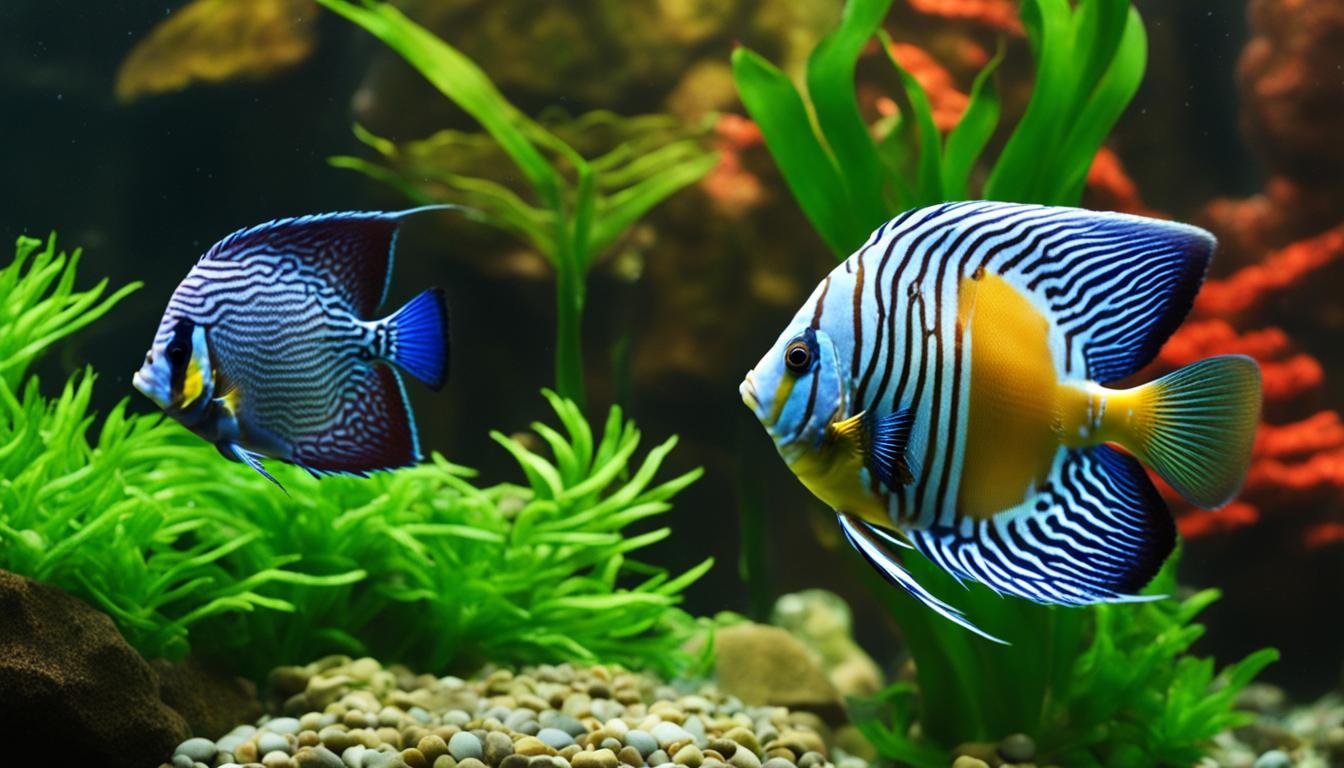
Are Discus Compatible With Angel Fish? Unveiling the Truth
Discus and Angel Fish are both beloved choices for aquarium enthusiasts. But can these two species coexist in the same tank? Let’s explore the compatibility of Discus and Angel Fish and uncover the truth behind keeping them together.
Key Takeaways:
- Compatibility of Discus and Angel Fish depends on various factors.
- Consider tank size, water conditions, temperament, and feeding habits when keeping them together.
- Discus and Angel Fish both require spacious tanks and specific water parameters for optimal health.
- Observe their behavior closely to prevent conflicts and ensure proper nutrition for both species.
- Select compatible tank mates and follow a quarantine process when introducing Discus and Angel Fish to a shared tank.
Factors to Consider When Keeping Discus and Angel Fish Together
When it comes to keeping Discus and Angel Fish together in the same tank, there are several important factors to consider. These factors play a crucial role in determining the compatibility and successful cohabitation of these two popular aquarium species. By carefully considering these factors, you can create a harmonious environment for both Discus and Angel Fish.
Tank Size:
The size of the tank is an important consideration when keeping Discus and Angel Fish together. Discus are known to grow quite large, so a tank size of at least 50 gallons is recommended to provide them with enough space to thrive. This will also help reduce territorial conflicts and aggression between the fish.
Water Conditions:
Water conditions are another crucial factor to consider. Discus prefer warm and soft water, while Angel Fish can tolerate a wider range of parameters. Finding a balance that suits both species is important. Maintaining a temperature of around 80°F and a pH level between 6.5 and 7.5 is ideal for the well-being of both Discus and Angel Fish.
Temperament:
The temperament of the fish is an important aspect to assess before keeping them together. Discus are generally peaceful, but they can become territorial during breeding or when establishing dominance. Angel Fish, on the other hand, are known to be more aggressive, especially towards smaller or slower-moving tank mates. Careful observation and monitoring of their behavior will help identify and prevent any potential conflicts.
By considering these factors—tank size, water conditions, and temperament—you can increase the chances of successful cohabitation between Discus and Angel Fish. It is important to provide ample space, maintain suitable water conditions, and choose compatible tank mates to ensure the well-being of both species. With proper care and attention, you can create a thriving and harmonious aquarium environment for your Discus and Angel Fish.
Tank Size Requirements for Discus and Angel Fish
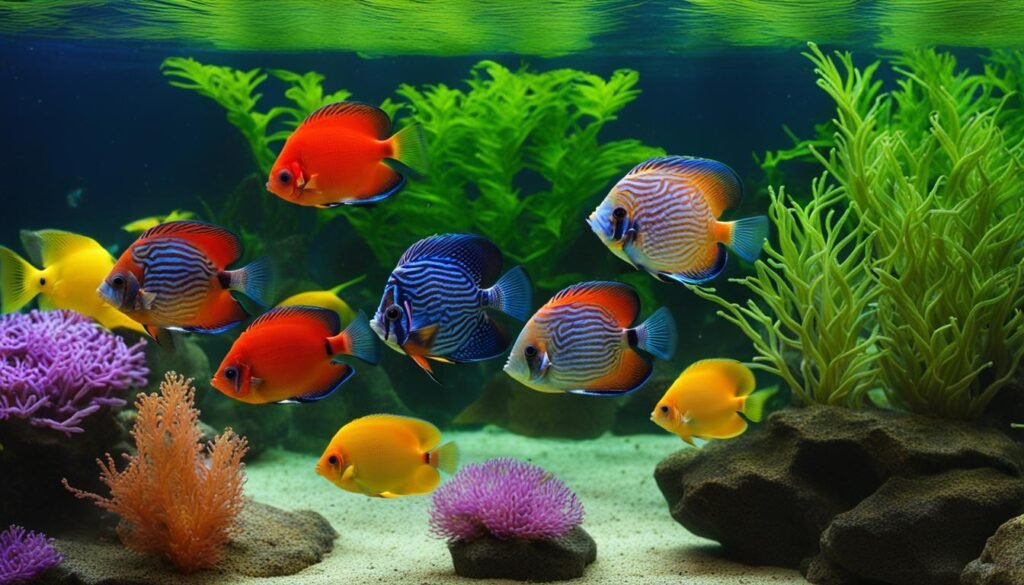
When it comes to keeping Discus and Angel Fish together, one of the critical factors to consider is the size of the tank. Both species require ample space to establish their territories and reduce the likelihood of aggression. Specifically, Discus are known to grow quite large, so it is recommended to provide a tank size of at least 50 gallons to accommodate their needs. This larger tank size will also give the Angel Fish plenty of room to swim and thrive alongside the Discus.
By providing a spacious tank, you not only create a comfortable environment for both species but also minimize the risk of overcrowding and stress. Remember, a larger tank means more water volume, which helps maintain stable water parameters, ensuring the well-being of your Discus and Angel Fish.
Benefits of a larger tank:
- Allows both species to establish territories
- Reduces aggression and stress levels
- Provides ample swimming space for Angel Fish
- Maintains stable water parameters
Having a suitable tank size is the foundation for creating a harmonious and thriving aquatic ecosystem for your Discus and Angel Fish. Let’s now explore other important considerations such as water conditions, temperament, and feeding habits in the following sections.
Water Conditions for Discus and Angel Fish
When it comes to keeping Discus and Angel Fish together, one of the key factors to consider is the water conditions. Discus fish prefer warm and soft water, while Angel Fish can tolerate a wider range of parameters. To ensure compatibility and the well-being of both species, it is important to find a balance that suits both.
For Discus, maintaining a water temperature of around 80°F is ideal. Additionally, the pH level should be between 6.5 and 7.5 to create a suitable environment. It is important to note that sudden changes in water conditions can be stressful for both Discus and Angel Fish, so it is best to avoid drastic fluctuations.
Regular water testing is crucial to monitor the water parameters and make any necessary adjustments. Using a reliable water testing kit, you can check the temperature, pH level, and other important parameters to ensure that the conditions are optimal for both Discus and Angel Fish.
Key points for water conditions:
- Discus prefer warm and soft water
- Angel Fish can tolerate a wider range of parameters
- Maintain a water temperature of around 80°F
- The pH level should be between 6.5 and 7.5
- Avoid sudden changes in water conditions
- Regularly test water parameters and make adjustments as needed
By providing the appropriate water conditions, you can create a harmonious environment for both Discus and Angel Fish. Remember to prioritize the well-being of the fish and monitor their behavior closely. With proper care and attention, the cohabitation of Discus and Angel Fish can be successful.
Temperament of Discus and Angel Fish
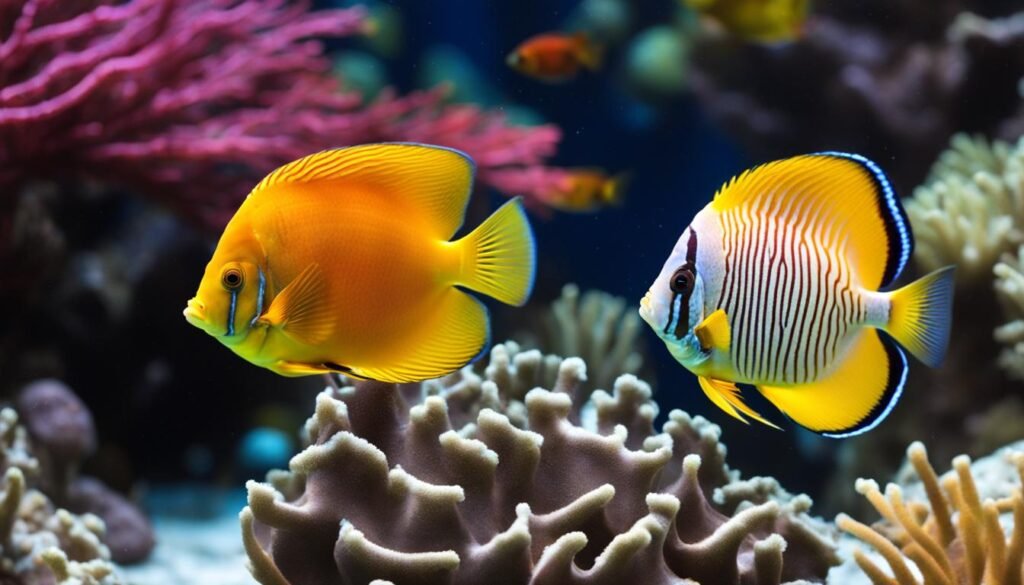
When considering the compatibility and cohabitation of Discus and Angel Fish, it is important to understand the temperament of both species. Discus are generally peaceful fish, but they can become territorial during breeding or when establishing dominance. On the other hand, Angel Fish are known to be more aggressive, especially towards smaller or slower-moving tank mates.
To ensure a harmonious tank environment, it is crucial to carefully observe the behavior of both Discus and Angel Fish when introducing them. Monitor for any signs of aggression or bullying, such as chasing, nipping, or fin damage. These behaviors may indicate that the two species are not compatible and should be separated.
Creating a Peaceful Tank:
- Provide ample hiding spaces: Adding plants, rocks, or driftwood to the tank can create hiding spots for both Discus and Angel Fish. This helps to reduce stress and minimize aggressive behavior.
- Monitor tank dynamics: Regularly observe the fish’s interactions and behavior. If any signs of aggression or stress are observed, it may be necessary to rearrange the tank or separate the incompatible individuals.
- Choose compatible tank mates: When selecting tank mates for Discus and Angel Fish, it is important to choose peaceful species that have similar temperament and size. Avoid adding aggressive or fin-nipping fish to the same tank.
By taking these precautions and creating a peaceful tank environment, you can increase the chances of successful cohabitation between Discus and Angel Fish.
Feeding Considerations for Discus and Angel Fish
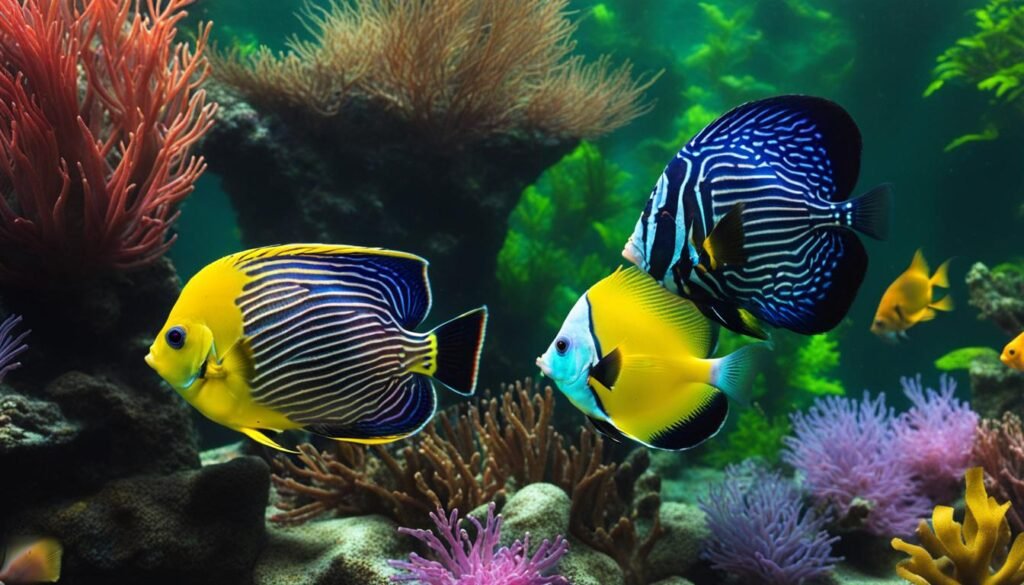
When it comes to keeping Discus and Angel Fish together, one important aspect to consider is their feeding habits. Discus have specific dietary requirements and need a varied diet consisting of high-quality pellets, frozen or live foods. It is important to provide them with a well-balanced and nutritious diet to ensure their health and vibrant coloration.
On the other hand, Angel Fish are omnivorous and can thrive on a diet of flakes, pellets, and frozen or live foods. They can be fed a diet that includes both plant matter and protein sources. However, it is important to avoid overfeeding, as Angel Fish have a tendency to overeat, which can lead to health issues.
When feeding both Discus and Angel Fish together, it is recommended to feed them separately to ensure that each species gets their fair share of food. This can be done by using feeding rings or targeted feeding areas within the tank. It is also important to observe the feeding behavior of both species to ensure that all fish are getting enough food and to prevent any aggression or competition over food.
Potential Challenges When Keeping Discus and Angel Fish Together
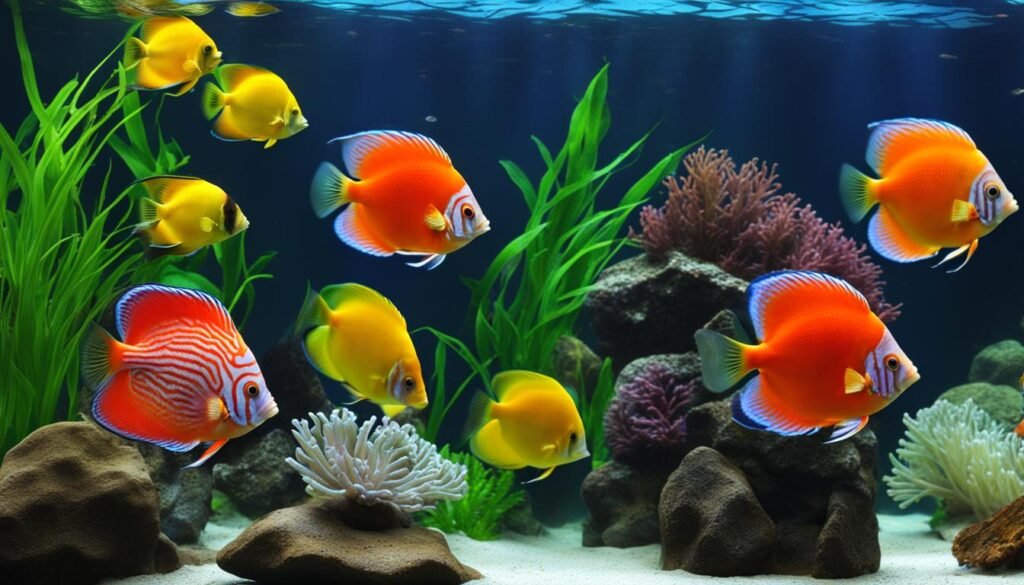
While keeping Discus and Angel Fish together can be a rewarding experience, it is important to be aware of the potential challenges that may arise. By understanding and addressing these challenges, we can increase the likelihood of a harmonious cohabitation between these two species.
1. Aggressive Behavior
One of the main challenges when keeping Discus and Angel Fish together is the possibility of aggressive behavior. Both species can become territorial, especially during breeding or when establishing dominance. To mitigate this aggression, it is essential to provide ample hiding spaces and visual barriers in the tank. This will allow fish to establish their own territories and reduce the likelihood of aggressive encounters.
2. Competition for Food
Discus and Angel Fish have different feeding habits and nutritional requirements. Discus are known to be slow eaters, while Angel Fish can be more aggressive when it comes to feeding. This can lead to unequal distribution of food and potential stress for the fish. To alleviate this challenge, it is recommended to feed the fish in separate areas of the tank or use feeding rings to ensure that all fish have access to their share of food.
3. Differences in Water Requirements
Discus prefer warm and soft water conditions, while Angel Fish are more adaptable to a wider range of parameters. However, it is important to find a balance that suits both species. Regular monitoring and maintenance of water parameters such as temperature, pH, and hardness are crucial. Using a reliable water testing kit and making necessary adjustments will help create a suitable environment for both Discus and Angel Fish.
By being aware of these potential challenges and taking appropriate measures, we can create a conducive environment for Discus and Angel Fish to coexist peacefully. Remember, each tank and combination of fish is unique, so close observation and adaptability are key to ensuring the well-being and compatibility of these beautiful aquatic species.
Best Tank Mates for Discus Fish and Compatible Fish for Discus and Angel Fish
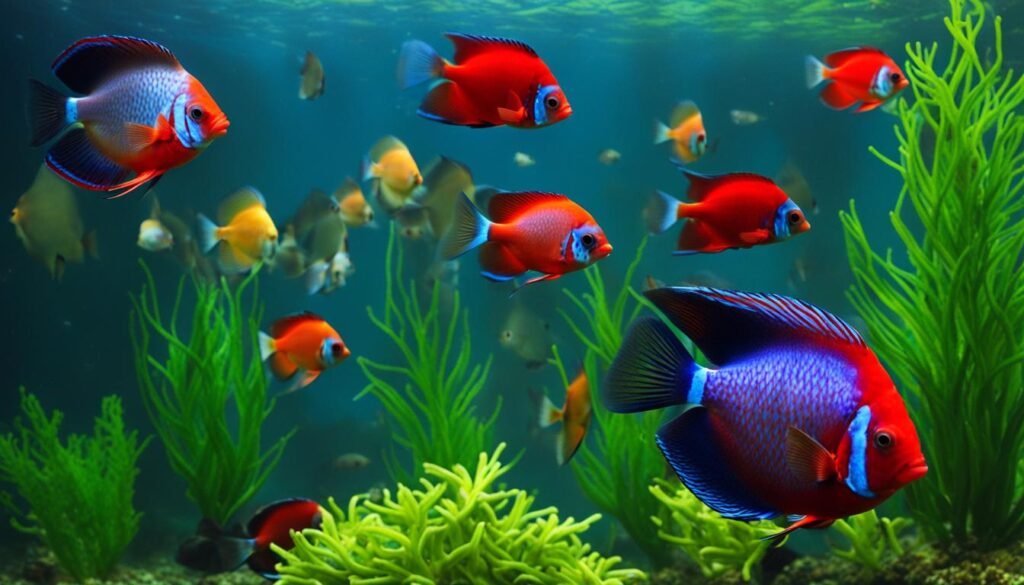
When it comes to keeping Discus fish and Angel fish together in an aquarium, choosing the right tank mates is crucial for a harmonious and thriving underwater community. Here are some of the best species that make compatible companions for Discus and Angel fish:
1. Tetras
Tetras are peaceful schooling fish that can coexist harmoniously with Discus and Angel fish. Their vibrant colors and active nature add beauty and liveliness to the tank. Some popular choices include Cardinal tetras, Rummy nose tetras, and Neon tetras.
2. Corydoras Catfish
Corydoras catfish, also known as Cory cats, are excellent tank mates for Discus and Angel fish. These bottom-dwelling fish help keep the aquarium clean by scavenging for food particles. They are peaceful and won’t disturb the other fish in the tank.
3. Gouramis
Gouramis are another compatible fish species that can be kept with Discus and Angel fish. These calm and colorful fish add variety to the aquarium. However, it’s essential to choose peaceful Gourami varieties, such as Dwarf Gouramis or Honey Gouramis, to avoid any aggression issues.
4. Bolivian Rams
Bolivian Rams are known for their peaceful temperament and beautiful coloration. These cichlids are a suitable choice for a community tank with Discus and Angel fish. They can thrive in similar water conditions and make for interesting companions.
Remember, when introducing new fish to your tank, it’s crucial to monitor their behavior closely. Remove any aggressive or fin-nipping fish immediately to maintain a peaceful environment for your Discus and Angel fish.
Introduction and Quarantine Process for Discus and Angel Fish
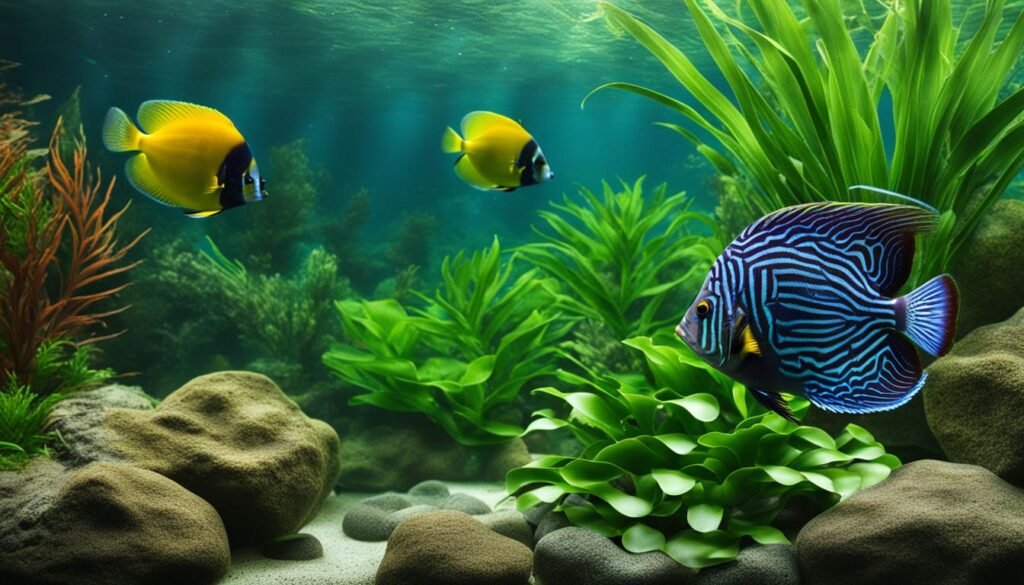
When it comes to keeping Discus and Angel Fish together, it is crucial to follow a proper introduction and quarantine process. This ensures the health and well-being of both species and reduces the risk of potential diseases spreading in the main tank.
The first step is to set up a quarantine tank, separate from the main tank, where the new fish will be temporarily housed. This allows for observation and potential treatment if any health issues arise. The quarantine tank should have similar water conditions as the main tank, including temperature and pH levels.
Before introducing the new Discus and Angel Fish to the quarantine tank, it is recommended to observe them closely for any signs of illness, such as abnormal behavior, lethargy, or visible infections. If any signs are detected, it is important to consult with a veterinarian or an experienced fish keeper to determine the best course of action.
Quarantine Period:
During the quarantine period, which typically lasts for about 2 to 4 weeks, it is essential to closely monitor the health and behavior of the new fish. Regular water testing should be performed to ensure optimal water quality, and any necessary adjustments should be made.
Introducing the Fish to the Main Tank:
After the quarantine period, when the new Discus and Angel Fish have been deemed healthy and disease-free, they can be gradually introduced to the main tank. To minimize stress and potential aggression, it is recommended to dim the lights and provide hiding places, such as plants or caves, for the fish to establish their territories.
It is important to monitor the behavior of all fish closely during this transition phase. If any aggression or territorial disputes occur, it may be necessary to rearrange decorations or add additional hiding places to reduce conflict. Ensuring a well-balanced diet and maintaining suitable tank conditions will help promote the compatibility and overall well-being of Discus and Angel Fish in the long term.
- Set up a separate quarantine tank with similar water conditions as the main tank.
- Observe the new fish closely for signs of illness before introducing them to the quarantine tank.
- Monitor the health and behavior of the fish during the 2 to 4 week quarantine period.
- Gradually introduce the healthy fish to the main tank, providing hiding places and dimming the lights.
- Monitor the behavior of all fish closely and make adjustments if aggression or territorial disputes occur.
By following these steps and taking the necessary precautions, you can increase the chances of successful cohabitation between Discus and Angel Fish. Remember, the well-being of the fish should always be the top priority when keeping them together.
Monitoring and Maintenance Tips for Discus and Angel Fish Tank
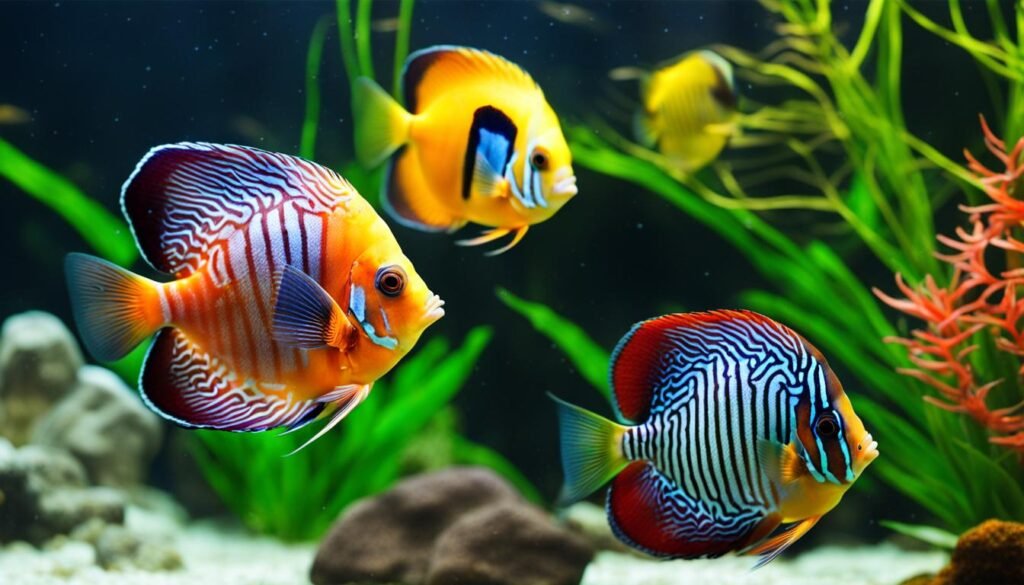
Keeping Discus and Angel Fish together requires diligent monitoring and regular maintenance to ensure the well-being of both species. Here are some essential tips for maintaining a successful and harmonious tank:
1. Regular Water Testing:
Regularly test the water parameters such as temperature, pH level, ammonia, nitrite, and nitrate levels. Maintain stable and optimal water conditions to promote the health and vitality of Discus and Angel Fish.
2. Observing Fish Behavior:
Pay close attention to the behavior of the fish in your tank. Look out for any signs of aggression, stress, or illness. Early detection of any issues can help prevent potential problems and allow for prompt intervention.
3. Proper Cleaning and Maintenance:
Regularly clean the tank by removing debris, uneaten food, and waste. Perform partial water changes to maintain good water quality. Avoid using harsh chemicals that may harm the fish. Use a gravel vacuum to remove any accumulated waste from the substrate.
4. Balanced and Nutritious Diet:
Provide a well-balanced diet for both Discus and Angel Fish. Feed them high-quality pellets, flakes, frozen or live foods that cater to their specific nutritional needs. Avoid overfeeding to prevent water pollution and obesity-related issues.
By following these monitoring and maintenance tips, you can create a thriving environment for Discus and Angel Fish, ensuring their compatibility and overall well-being.
Expert Tips on Successful Cohabitation of Discus and Angel Fish
Successfully keeping Discus and Angel Fish together can be a rewarding experience, but it requires careful consideration of various factors. Here are some expert tips to help you achieve compatibility between these two species and create a harmonious environment in your aquarium:
Create Ample Hiding Spaces
Both Discus and Angel Fish appreciate having hiding spaces in the tank. This helps them establish territories, reduce stress, and avoid potential conflicts. You can provide hiding spaces through the use of driftwood, rocks, or plants. Ensuring that each fish has its own designated area can contribute to a peaceful coexistence.
Maintain Consistent Water Conditions
Consistency is key when it comes to the water conditions for Discus and Angel Fish. Regularly monitor and maintain the temperature, pH level, and water quality to ensure a stable and suitable environment for both species. Sudden changes in water parameters can cause stress and negatively affect their well-being. Remember to perform regular water tests and make adjustments as needed.
Choose Compatible Tank Mates
When selecting tank mates for Discus and Angel Fish, it is important to choose species that have similar temperament and water requirements. Peaceful fish that are not fin-nippers and can tolerate the warm water conditions preferred by Discus are usually good choices. Some compatible options include Tetras, Corydoras catfish, and peaceful bottom-dwelling species. Avoid aggressive or territorial fish that may disrupt the harmony in the tank.
By following these expert tips, you can increase the chances of successful cohabitation between Discus and Angel Fish. Remember to closely monitor the tank, provide proper care, and prioritize the well-being of both species. With patience and careful attention, you can create a beautiful and thriving aquarium that houses these stunning fish together.
Conclusion
In summary, the compatibility of Discus and Angel Fish can be achieved with careful consideration of various factors. When keeping these species together, it’s important to ensure the tank size is sufficient to accommodate their needs. A tank size of at least 50 gallons is recommended to provide ample space for both species to establish their territories.
Additionally, maintaining the right water conditions is crucial for their well-being. Discus prefer warm and soft water, while Angel Fish can tolerate a wider range of parameters. Striking a balance with a temperature around 80°F and a pH level between 6.5 and 7.5 will benefit both species.
Understanding the temperament of Discus and Angel Fish is key to successful cohabitation. While Discus are generally peaceful, Angel Fish can exhibit aggression, especially towards smaller or slower-moving tank mates. Careful observation of their behavior is important to prevent conflicts.
Lastly, ensuring a proper diet and monitoring the tank are essential. Discus have specific dietary needs, requiring a varied diet of high-quality pellets, frozen, and live foods. Angel Fish, on the other hand, are omnivorous and can thrive on a variety of foods. Regular monitoring, maintenance, and providing suitable tank mates will help create a harmonious environment for both Discus and Angel Fish.
FAQ
Are Discus compatible with Angel Fish?
Yes, it is possible to keep Discus and Angel Fish together, but certain factors need to be considered for successful cohabitation.
What factors should be considered when keeping Discus and Angel Fish together?
Factors such as tank size, water conditions, temperament, and feeding habits should be taken into account.
What is the recommended tank size for Discus and Angel Fish?
A tank size of at least 50 gallons is recommended to provide enough space for both species to establish their territories.
What are the ideal water conditions for Discus and Angel Fish?
The water should be maintained at a temperature of around 80°F and have a pH level between 6.5 and 7.5.
What is the temperament of Discus and Angel Fish?
Discus are generally peaceful, but they can become territorial during breeding. Angel Fish are known to be more aggressive, especially towards smaller tank mates.
What are the feeding considerations for Discus and Angel Fish?
Discus require a varied diet of high-quality pellets, frozen, or live foods, while Angel Fish can thrive on flakes, pellets, and frozen or live foods.
What are the potential challenges when keeping Discus and Angel Fish together?
Potential challenges include aggressive behavior, competition for food, and differences in water requirements.
What are suitable tank mates for Discus and Angel Fish?
Suitable tank mates include Tetras, Corydoras catfish, and peaceful bottom-dwelling species. Avoid aggressive or fin-nipping fish.
What is the recommended introduction and quarantine process for Discus and Angel Fish?
It is recommended to follow a proper quarantine process to ensure the health and well-being of both species before introducing them to the main tank.
What are some monitoring and maintenance tips for a Discus and Angel Fish tank?
Regular water testing, cleaning, and observation of fish behavior are crucial to detect any potential issues early on.
What are some expert tips for successful cohabitation of Discus and Angel Fish?
Providing ample hiding spaces, maintaining consistent water conditions, and carefully selecting compatible tank mates are key to successful cohabitation.
Leave a Reply